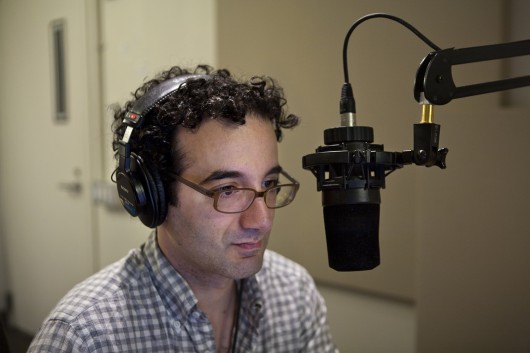
Jad Abumrad of NPR’s Radiolab spoke to OSU Nov. 24 in an OUAB-sponsored event.
Credit: Courtesy of the MacArthur Foundation
Jad Abumrad, founder of the popular radio show and podcast Radiolab, made an appearance at the Ohio Union Monday to recount some of his struggles through the creative process and what they’ve taught him about finding ideas, questions and answers.
Radiolab airs on more than 450 National Public Radio stations in the U.S. and is hosted by Abumrad and Robert Krulwich, according to its website. Abumrad’s background in music production shines through Radiolab’s style, as he takes sound bites from interviews, conversations, sound effects, music and more and strings them together in a fast-paced, stream-of-consciousness form to shape a coherent story, usually on topics surrounding science and philosophy.
“There’s something really cool to me about audio precisely in that it lacks pictures,” Abumrad said. “It forces the person on the other end to make up for the absence with you. It’s like I’m handing you the paint brush, and you’re finishing the painting, and I like that. It’s an empathetic act and a warm medium in that sense.”
His lecture at OSU, titled “Gut Churn,” was reminiscent of Radiolab’s conversational tone thanks to auditory and visual aids, and it was centered on a concept that Ira Glass has also called “the gap,” or the moments between having an idea and generating work that successfully holds consistent with the creator’s original vision.
“There’s no shortcut,” Abumrad said about steering through the Gut Churn. “If you’re taking creativity seriously, an inevitable part of the process is that you just have to sit there in the emptiness and find authenticity. You don’t know if you’re going to get one of those moments of synthesis; one of those inspiring little points of inflection.”
He explored ways to think about moving forward amid periods of doubt by illustrating three concepts that have helped him overcome creative struggles, all of which were obtained by Abumrad in personal moments of revelation or inspiration.
“When I’m in one of these gap states where I don’t know quite what to do, which is often, I ask myself, ‘Am I putting my whole body and mind into this question?…And ultimately, am I pursuing this question beyond the point of reason? Because that’s when it gets good — when it stops being reasonable,” Abumrad said, inspired by radio-producer Scott Carrier’s piece “Running after antelope.”
Secondly, he discussed on focusing on “the little s—” that often makes a story, scene or work of art.
“It’s a way of thinking about tiny, insignificant details that seem to lead you to that right question,” he said. “They mysteriously or suddenly give a scene a depth of field.”
Thirdly, Abumrad talked about taking risks and how to measure your odds when going into the creative process. He also touched on Radiolab’s non-traditional style, which exposes the struggle of finding journalistic answers on the air, instead of behind the scenes.
“We started the show in the spirit of experimentation and kind of found our footing for a while and did a series of stories that I’m proud of, but we stayed within a certain topic zone,” Abumrad said. “Now I want to blow that up and see what other things we can talk about … sports, politics, counterterrorism, anything. I just want to go different places.”
He said Radiolab is about 50 percent scripted and made a connection with the audience by talking about its modest beginnings.
“In 2004, we were marooned on the schedule in New York City on late Sunday nights,” Abumrad said. “It turns out, as I would find many years later, that WNYC actually drops the power of the AM signal at night … so you literally had to be hugging the transmitter to get the station to hear my show. So literally no one was listening, because they couldn’t.”
Abumrad graduated from Oberlin College in 1995 with a degree in creative writing and music composition and has formerly worked for National Public Radio’s “All Things Considered,” written music for films, produced documentaries during the aftermath of 9/11 and more.
“He uses narrative to talk about science in a way that is both extremely understandable and compelling for a generalized audience,” said Cecily Hill, chair of the Ohio Union Activities Board graduate and professional programming committee, which hosted the event. “He’s interested in the way that stories impact our understanding of science and ways of seeing the world.”
In 2011, he was named a MacArthur Fellow, which includes a no-strings-attached grant that’s given to between 20-40 individuals or institutions each year by the John D. and Catherine T. MacArthur Foundation, according to their website. The foundation coined Abumrad’s auditory style a “distinctive new aesthetic” in broadcast radio.
“His aesthetic is really lively; I haven’t heard any podcast like it before,” said Melissa Wrzesien, a second-year graduate student in the School of Earth Sciences who listens to Radiolab. “It’s a different way of learning that’s new, fun and makes you care about subjects that you might not have any background in.”
Abumrad closed his speech by relaying the importance of human companionship in the creative process.
“Maybe the single best thing I can say about walking through periods of doubt is just to walk with someone next to you,” Abumrad said. “We can all swim through the gut churn, navigate the gap … and devour this darkness together.”


